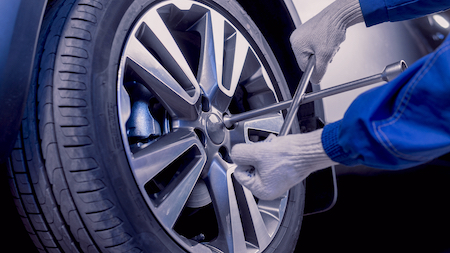Automobiles are expensive. Prices are steadily rising. According to a recent JD Power survey, the average price paid for a new car was $46,437 in January 2023.
That makes maintenance that much more critical. Do you know the importance of tire rotation?
What is tire rotation?
Tire rotation moves the tires from one position to another. Typically, this involves moving the front tires to the rear and the rear tires to the front, but sometimes the left and right tires may also be swapped. Tire rotation aims to promote even wear on all four tires, which can help extend their lifespan and improve overall handling and performance.
Tire wear can be uneven due to a variety of factors, such as the weight distribution of the vehicle, the alignment of the wheels, and driving habits. By rotating the tires regularly, drivers can ensure that the tires wear evenly and avoid the need to replace them prematurely.
Most tire manufacturers recommend that tire rotation be done every 5,000 to 8,000 miles. Check your owner’s manual for more information.
Why is tire rotation important?
Swapping tires from one position to another may be easy to forget. Yet it can have a significant impact on the longevity of your tires. Schedule tire rotation regularly for several reasons:
Even wear – Tires can wear differently based on their position on the vehicle. For example, front tires typically wear faster than rear tires due to the engine’s weight and the fact that the front tires are responsible for steering and braking. By rotating the tires, the wear can be distributed evenly, which helps extend the tires’ life.
Prolongs tread life – Tires average about six years of life. Rotating the tires regularly ensures every aspect of the tire tread will be utilized throughout its life. How a tire wears depends on many things, including tire quality, design, driving style, and geographical location. A car subjected to intense heat and sunlight can also cause premature wear.
Improved handling and performance – Uneven tire wear can lead to handling and performance issues, such as vibrations, pulling to one side, and reduced traction. By rotating the tires, drivers can maintain consistent handling and performance, improving safety and comfort.
Cost savings – Tires can be a significant expense for vehicle owners. Rotating the tires regularly can help to extend their lifespan. This means the tires won’t wear out prematurely, saving you money by not having to replace tires as frequently.
Warranty requirements – Some tire manufacturers require regular tire rotation as part of their warranty requirements. Failure to comply with these requirements can void the warranty.
What is a tire rotation pattern?
It may seem like a simple task – simply swap one tire for another. Yet there are specific guidelines for how you rotate your tires.
A tire rotation pattern refers to the specific way in which the tires are rotated on a vehicle. Several tire rotation patterns are designed to address different types of tire wear and specific vehicle configurations.
Some of the most common tire rotation patterns include:
Rearward cross – This pattern involves moving the rear tires to the front and the front tires to the opposite sides of the rear axle. For example, the left front tire is transferred to the right rear position, and the right front tire is moved to the left back position. This pattern is commonly used on front-wheel-drive vehicles.
Forward cross – This pattern is similar to the rearward cross pattern, but the front tires are moved straight back to the rear, and the rear tires are moved to the opposite sides of the front axle. This pattern is commonly used on rear-wheel-drive vehicles.
X-pattern – In this pattern, the tires are moved diagonally, with the front left tire moved to the rear right position, and the front right tire moved to the back left position. The rear tires are moved straight forward to the front.
Side-to-side – This pattern involves swapping the left and right tires while keeping them in their original position on the vehicle. This pattern is commonly used on cars with directional tires, which can only be rotated side-to-side.
What happens if you don’t rotate your tires regularly?
Tire rotation seems like such a simple thing. In fact, it might be easy to forget. Yet forgetting can cause several different issues, including:
Uneven tire wear – Tires can wear unevenly if not rotated regularly. When this happens, tires on one side of the vehicle may wear more than the other side. This can lead to handling and performance issues, such as vibrations, pulling to one side, and reduced traction.
Reduced tire lifespan – Uneven tire wear can also cause tires to wear out more quickly, meaning you’ll have to buy new tires more frequently. This can be expensive, as tires are a significant expense for vehicle owners.
Safety issues – Uneven tire wear can affect the handling and performance of the vehicle, which can compromise safety. Worn tires may not provide adequate traction in wet or slippery conditions, increasing the risk of accidents.
Warranty issues: Some tire manufacturers require regular tire rotation as part of their warranty requirements. Failure to comply with these requirements can void the warranty.
Have you scheduled tire rotation for your vehicle?
Like every maintenance item on your vehicle, tire rotation is easy to forget but will cost you even more in the long run.
Like oil changes, put tire rotation on your calendar and bring it in for regular maintenance. If you haven’t had your tires rotated in a while, make today the day you bring your vehicle in.
How can we help you maintain your vehicle in the best possible condition?

